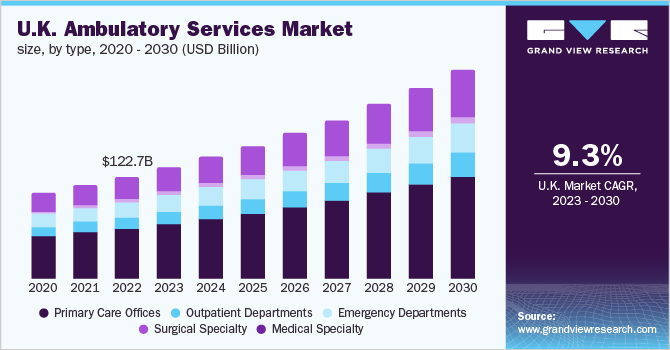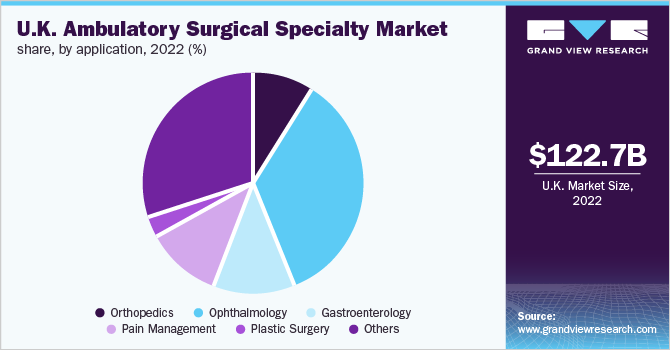- Home
- »
- Medical Devices
- »
-
U.K. Ambulatory Services Market Size & Share Report, 2030GVR Report cover
![U.K. Ambulatory Services Market Size, Share & Trends Report]()
U.K. Ambulatory Services Market (2023 - 2030) Size, Share & Trends Analysis Report By Type (Primary Care Offices, Outpatient Departments, Emergency Departments, Surgical Specialty, Medical Specialty) And Segment Forecasts
- Report ID: GVR-2-68038-341-6
- Number of Report Pages: 80
- Format: PDF
- Historical Range: 2017 - 2021
- Forecast Period: 2023 - 2030
- Industry: Healthcare
- Report Summary
- Table of Contents
- Segmentation
- Methodology
- Download FREE Sample
-
Download Sample Report
Report Overview
The U.K. ambulatory services market value was USD 122.7 billion in 2022 and is expected to expand at a compound annual growth rate (CAGR) of 9.30% from 2023 to 2030. The market for ambulatory services in the U.K. is largely influenced by the need to decrease overcrowding at hospitals due to avoidable hospital admissions. Moreover, in past few years, the number of surgeries performed on a same-day basis has increased in the U.K This has significantly impacted the growth of the market and can be attributed to the reduction in unit costs and increase in volumes of procedures performed.

The hospitals in the U.K. are increasingly getting overcrowded resulting in longer waiting times for the patient. According to the NHS factsheet, the waiting list for treatment at hospitals rose to around 6.5 million in April 2020. The Emergency departments were most severely impacted by the overcrowding of the patients.
According to an analysis by the Royal College of Medicine, England witnessed 4,519 excess deaths in 2020-2021 owing to overcrowding & more than 12 hours of overstay in the emergency departments This is resulting in an increase in the development of outpatient services for reducing the waiting times. Moreover, the high burden of COVID-19 patients on hospitals amid the pandemic led to patients being shifted to ambulatory service centers for rapid and same-day treatment.
The elderly population in the U.K. has witnessed a rise in recent times. 11 million people in the U.K. are over 65 years of age currently. By 2032, the elder population is expected to research 13 million. According to the University of Manchester, England & Wales has recorded the highest aging population in the U.K. One in 5 people in England & Wales is above 65 years of age. The population over 85 in England is expected to double in the next 25 years reaching 2.6 million.
The prevalence of chronic disorders & requirement for surgery is higher in the elder population. The geriatric population is preferring reduced hospital stays & minimally invasive treatment. Thus, the demand for ambulatory care is rising. During the COVID-19 pandemic, the risk of infection resulted in the elder population shifting to ambulatory care, to avoid hospital visits.
The ambulatory care centers provide services of the highest standard being focused on only the type of specialty they provide. Ambulatory care facilities have lower incidences of post-surgery infection compared to hospitals. According to recent studies on surgery infection rate, the risk of infection post-surgery at the ambulatory facility is 1 or 2 incidences of infection per 1000 patients. The hospitals reported nearly 20 times more infection rate, having up to 20 cases per 1000 patients.
The negligible rate of infection in ambulatory care is increasing the preference for these services. As per the National Library of Medicine, 5% of all surgeries in the U.K. are linked with infection post-surgery resulting in huge postoperative morbidity and a burden on healthcare resources in the region, thus resulting in increased attention towards ambulatory services.
COVID-19 U.K. ambulatory services market impact: 8.84% growth from 2021 to 2022
Pandemic Impact
Post COVID Outlook
The onset of the COVID-19 pandemic resulted in a huge burden on the healthcare system in the U.K. Hospitals witnessed a high burden of treating COVID-19 patients. The outpatient facilities were restricted from performing elective surgeries, thus severely impacting these segments. The National Health Services U.K. redesigned the services by releasing more capacity for COVID-19 patients.
The government has shown interest in transforming outpatient care for reducing the burden on hospitals. The NHS has proposed a long-term plan focusing on enabling quality personalized care for patients. The initiatives mainly aim at having advanced digitally-enabled primary care ambulatory services all over the U.K. in the next 5 years. Such initiatives are expected to drive the market post COVID-19
The later phases of the pandemic witnessed a higher preference for ambulatory service among the patients owing to the higher risk of COVID-19 infection & longer waiting time in hospitals. Home healthcare services were trending during the pandemic resulting in many ambulatory care providers initiating home services.
Post-COVID-19, telehealth is expected to play a key role in healthcare. The key players in the market are adopting telehealth services & remote patient monitoring devices. Hospitals in the U.K. are also opening their ambulatory units to serve patients better. Patients for elective surgeries are likely to opt for outpatient care owing to an increase in the quality of ambulatory care due to government initiatives.
The cost of inpatient treatment in hospitals in the U.K. is very high. The cost of excess beds per day in NHS hospitals is USD 2,037 -2,469 for elective & non-elective treatment procedures. The total cost of inpatient care goes up to USD 6,892 for top patients which is quite expensive. Besides, the maximum cost of outpatient care is USD 1,582, wherein the costs can be as low as USD 138 for some patients. This is increasing the preference for outpatient ambulatory care, avoiding admission post-surgery to save cost.
The overall healthcare expenditure in the U.K. is skyrocketing. According to the Office for National Statistics, the healthcare sector comprises 45% of the government expenditure on goods & services. This is resulting in increased government interest in ambulatory care services. The British Association of Emergency Ambulatory Care is supporting the expansion of emergency ambulatory care. The association promotes same-day discharge for surgery patients.
Type Insights
The primary care office held the largest share of the market in 2021. The increase in funding for primary care services & lower cost of primary care compared to hospitals are driving the segment growth. Moreover, the technological adoptions in the primary care offices in the U.K are expected to propel the demand for the services during the forecast period. Numerous outpatient clinics in the U.K. offer face-to-face consultations which can be done via online or telemedicine applications.
The surgical specialty segment is expected to be the fastest-growing segment in the market during the forecast period. The non-requirement of admission & shorter recovery time post-surgery is driving the growth for the segment pain management and ophthalmic specialties are contributing the highest to the surgical specialties segment.

The surgeries for pain management & ophthalmic disorders are increasing in the U.K. as a result of the growing prevalence of such disorders and the aging population. Over 12 % of adults in the U.K. suffer from serious pain as per the British Medical Association. According to the latest research report by Taylor & Francis, cataract surgery is the most common surgery in the U.K., with 453,000 cataract surgeries performed in 2019. The NHS Scotland funded 35,777 cataract surgeries with a rate of 3,533 incidences per 100,000 adults in Scotland.
The emergency care segment is expected to exhibit lucrative growth during the forecast period, owing to the high need for emergency services in the U.K. and the initiatives by the government to support these services. The British Association for Ambulatory Emergency Care (BAEEC) is promoting the adoption, development & expansion of AEC (ambulatory emergency care) services in the U.K. The association is working with the Royal College of Emergency Medicine for creating new patient-level data set for emergency and ambulatory care.
The national AEC program by the British association & National Health Services (NHS) is enabling healthcare teams to connect & expand emergency services. Currently, the program is supporting & connecting 120 organizations across England. The need for emergency care in the U.K. is very high as per NHS. According to NHS, in April 2021, 189,644 residents call at the NHS were emergency healthcare cases, accounting for 12.4% of the calls received by NHS through its 111 urgent call services.
Key Companies & Market Share Insights
The market is highly fragmented with intense competitive rivalry. In addition, healthcare systems are partnering with or acquiring ambulatory service providers, instead of competing directly with the centers. The major healthcare providers in the market are adopting various strategies such as new facility launches, mergers & acquisitions, and partnerships to expand their market presence. For instance, in December 2020, Yeovil District Hospital opened a new Ambulatory Emergency Care unit with twice as many cubicles for patients. Some prominent players in the U.K. ambulatory services market include:
-
Guy's and St Thomas' NHS FT
-
Aspen Healthcare
-
BHR University Hospitals NHS Trust
-
Chelsea and Westminster Hospital NHS FT
-
Brighton and Sussex University Hospitals NHS FT
-
OneWelbeck
-
The Queen Elizabeth Hospital King's Lynn NHS FT
-
HCA Healthcare U.K.
-
Nottingham University Hospitals NHS FT
-
Milton Keynes NHS FT
U.K. Ambulatory Services Market Report Scope
Report Attribute
Details
Market size value in 2023
USD133.6 billion
Revenue forecast in 2030
USD 249.1 billion
Growth Rate
CAGR of 9.30% from 2023 to 2030
Base year for estimation
2022
Historical data
2017 - 2021
Forecast period
2023 - 2030
Quantitative units
Revenue in USD Billion and CAGR from 2023 to 2030
Report coverage
Revenue forecast, company ranking, competitive landscape, growth factors, and trends
Segments covered
Type
Country scope
U.K.
Key companies profiled
Guy's and St Thomas' NHS FT; Aspen Healthcare; BHR University Hospitals NHS Trust; Chelsea and Westminster Hospital NHS FT; Brighton and Sussex University Hospitals NHS FT; OneWelbeck; The Queen Elizabeth Hospital King's Lynn NHS FT; HCA Healthcare U.K.; Nottingham University Hospitals NHS FT; Milton Keynes NHS FT
Customization scope
Free report customization (equivalent up to 8 analysts working days) with purchase. Addition or alteration to country & segment scope.
Pricing and purchase options
Avail customized purchase options to meet your exact research needs. Explore purchase options
U.K. Ambulatory Services Market Segmentation
This report forecasts revenue growth at the country level and provides an analysis of the latest industry trends in each of the sub-segments from 2017 to 2030. For this study, Grand View Research has segmented the U.K. ambulatory services market report based on type
-
Type Outlook (Revenue, USD Billion, 2017 - 2030)
-
Primary Care Offices
-
Outpatient Departments
-
Emergency Departments
-
Surgical Specialty
-
Orthopedics
-
Ophthalmology
-
Gastroenterology
-
Pain Management
-
Plastic Surgery
-
Others
-
-
Medical Specialty
-
Share this report with your colleague or friend.
Need a Tailored Report?
Customize this report to your needs — add regions, segments, or data points, with 20% free customization.

ISO 9001:2015 & 27001:2022 Certified
We are GDPR and CCPA compliant! Your transaction & personal information is safe and secure. For more details, please read our privacy policy.
Trusted market insights - try a free sample
See how our reports are structured and why industry leaders rely on Grand View Research. Get a free sample or ask us to tailor this report to your needs.










